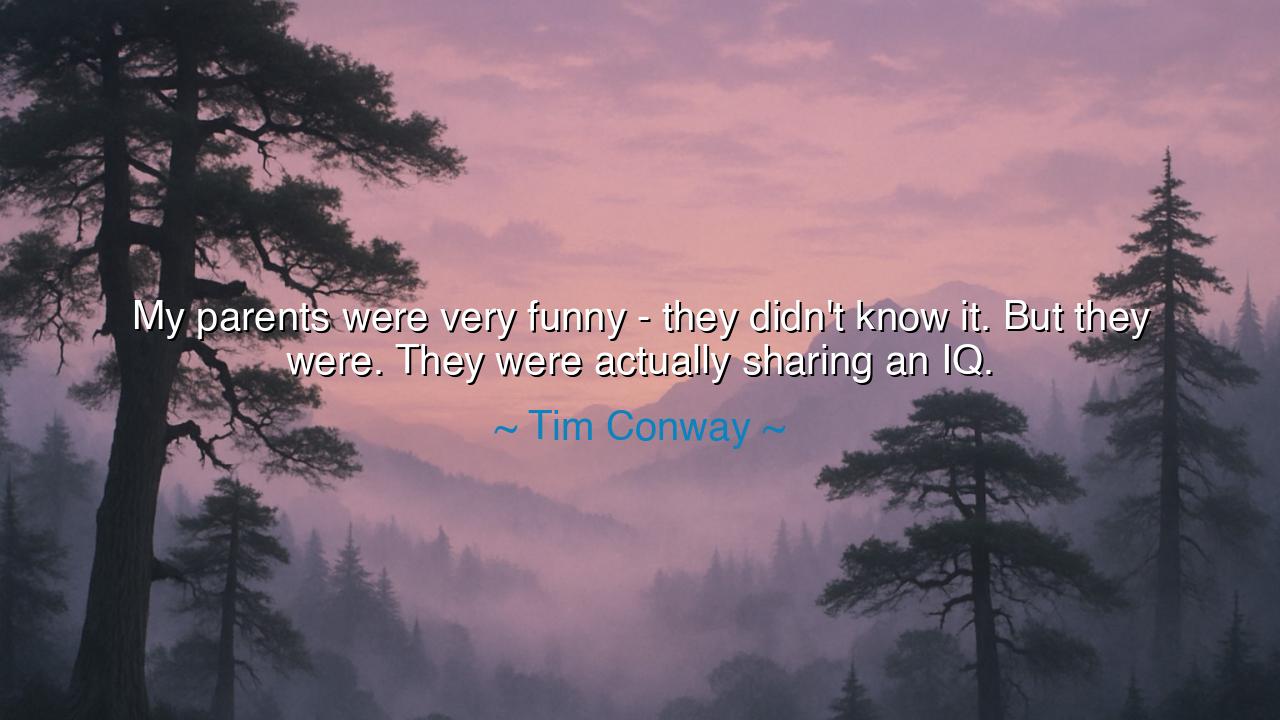
My parents were very funny - they didn't know it. But they were.
My parents were very funny - they didn't know it. But they were. They were actually sharing an IQ.






Hear, O seekers of laughter and light, the voice of Tim Conway, the humble jester whose humor softened the hearts of millions. He once said, with a twinkle of wit and love: “My parents were very funny—they didn’t know it. But they were. They were actually sharing an IQ.” To some, these words may sound like jest alone, but listen closer, and you will hear beneath them a song of affection, humility, and the sacred mystery of family. For in this quote, wrapped in laughter, lies a deeper truth—that humor is born not of perfection, but of human imperfection, and that love often hides itself behind the veil of teasing.
When Tim Conway spoke of his parents’ “shared IQ,” he was not mocking them but celebrating them—their quirks, their simplicity, their unintentional comedy that flowed from honesty rather than performance. They were, as he describes, “funny without knowing it.” And in that unawareness lay their charm. For true humor, unlike the polished art of the stage, springs not from calculation but from authenticity. The laughter that endures is not that which is forced, but that which arises naturally from life’s ordinary chaos—the missteps, misunderstandings, and the tender foolishness that makes us human.
Conway, known for his mischief and warmth on The Carol Burnett Show, learned from these moments at home. His parents’ humor—unpolished, real, accidental—became the soil from which his comedic genius grew. It was not cruelty but connection; not mockery, but memory. In them, he saw the beauty of imperfection, and from it, he built a lifetime of laughter. His words remind us that the origins of joy are often humble—that greatness in art and in heart is born from those who never sought to appear great at all.
Consider, then, the ancient philosophers who also found wisdom in folly. The Greeks told stories of Socrates, who called himself the wisest man in Athens precisely because he knew that he knew nothing. So too did Tim Conway, in jest, reveal the same truth through his parents’ “shared IQ.” They may have been simple, but their simplicity was their brilliance—it was freedom from pretense, the kind of self-forgetfulness that allows laughter to bloom. In their innocence, they carried what the wise have always sought: the ability to be at peace with one’s own smallness in the vastness of life.
And yet, there is more. Conway’s humor toward his parents also hides an act of love—a way of keeping them alive through laughter. Many of us carry such figures in our own memories: a mother whose habits made us laugh, a father whose sayings still echo in our minds, ridiculous yet dear. These are not moments of mockery but of remembrance. For laughter, when born from affection, becomes an act of honoring the past. The ancients built temples of stone; comedians like Tim Conway build temples of laughter, where memory itself is the offering.
In his jest, we find a sacred balance: humor and gratitude. To call one’s parents “funny” is to forgive them their flaws; to say they “didn’t know it” is to recognize their innocence. To laugh at them kindly is to love them more deeply than words could express. For laughter softens judgment, and when we can smile at the imperfections of those who raised us, we transcend resentment and step into grace. This, perhaps, is the secret meaning of Conway’s words—that laughter is the language of forgiveness, passed from one generation to the next.
Therefore, let this teaching be your own: find humor in the imperfections of life, and let that humor become love. Do not mock with cruelty, but smile with tenderness. Remember your parents, your teachers, your friends—not as perfect beings, but as beautifully flawed souls doing their best. Laugh with them, not at them. For in such laughter lies wisdom, peace, and connection. As Tim Conway showed, the heart that can laugh at its past is free, and the soul that can smile at its own foolishness will never be poor in joy.
So go forth, and carry this truth with you: laughter is not the opposite of seriousness—it is the completion of it. To laugh at life’s absurdities, to find beauty in its clumsy rhythm, is to understand what the wise and the fools both know: that we are all sharing an IQ, all stumbling, all divine in our imperfection. And in that shared folly lies the grace that makes us human—and the joy that makes life worth living.






AAdministratorAdministrator
Welcome, honored guests. Please leave a comment, we will respond soon